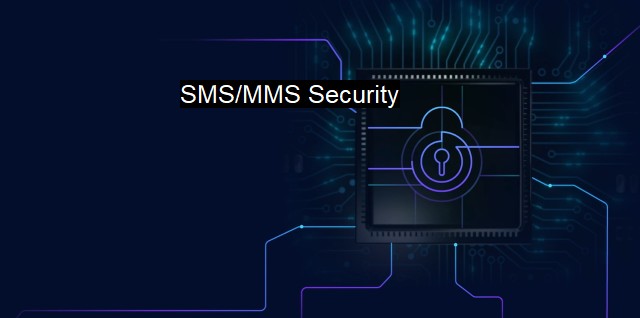What is SMS/MMS Security?
Exploring the Significance of SMS/MMS Security in Cybersecurity: Understanding Mobile-device Communication Protocols, Threats, and Best Practices"
SMS and MMS, acronyms for Short Message Service and Multimedia Messaging Service respectively, serve as the standard mobile communication modes for sending and receiving text messages and multimedia content. With smartphones becoming an integral part of personal and business life, these modes of communication have inevitably become targets for cybersecurity threats. Therefore, ensuring the security of SMS and MMS has become an important aspect of our digital lives.SMS and MMS security is principally about safeguarding communication protocols from malicious breaches, hacking attempts, and other cybersecurity vulnerabilities that might compromise data integrity, privacy, and security. As valuable mediums of communication, these services handle a significant variety of information, from personal and private messages to professional and business-related data. This critical data could be comprised if the security protocols for these communications are not adequately robust.
The scope of SMS and MMS security spans far and wide. It deals with protection from malware that could be potentially hidden in MMS. well-crafted fraudulent SMS posing threats of phishing are also covered under its ambit. Recognizing and defending against these security threats are a vital part of managing overall cybersecurity.
SMS threats often involve text messages from unknown sources that might trick the recipient into divulging personal information. This can result in identity theft, financial fraud, and other security breaches. On the other hand, MMS threats often exploit the use of embedded multimedia elements. For instance, an MMS could contain an infected video or audio file, which could potentially harm the smartphone and compromise the user's data once opened.
Antivirus and cybersecurity solutions, therefore, work towards mitigating these risks associated with SMS and MMS communications. Traditionally, antivirus solutions scanned computers for threats from the internet or physical devices. With the rise in mobile technology, antivirus solutions have expanded their scope to include mobile communications security. It's crucial for these solutions to constantly evolve to keep up with the rapidly changing threat landscape.
Effective antivirus software aids in bolstering SMS and MMS security by employing techniques to weed out such threats. They usually function by creating databases of known or suspected cyber threats and consequently rule out these threats through heuristic detection and automated responses. These antivirus solutions scan incoming messages and can either warn the user about potential threats or automatically delete the suspected harmful content.
Taking security measures, mobile operators deploy gateways for filtering SMS and MMS messages. By deploying specified rule sets, bulk messages can be blocked, spam detected, and offensive or unsolicited content filtered. It can also detect fraud, protect infrastructure, and secure all network operations.
Yet, securing the SMS and MMS has its challenges. Cyber threats are becoming more sophisticated, making it tough for security systems to counteract them. These cyber threat actors are constantly devising newer, innovative ways to deliver harmful items through these services.
As discussed, SMS and MMS security play a significant role in this era of expanding cyber threats. They safeguard valuable information traversing through ever-growing mobile communications, thus protecting personal, private, and business data. They are an essential part of a robust cybersecurity framework.
Antivirus and cybersecurity solutions for SMS and MMS are the first lines of defense. individuals and organizations share a responsibility in ensuring cybersecurity measures are in place. Vigilance is pivotal while dealing with unknown messages, links, or multimedia content received through SMS and MMS. Through collective oversight and appropriate security measures, successful mitigation of cyber threats posed by SMS and MMS is very much possible. SMS and MMS security showcase how fundamental and critical the aspect of mobile communication is in the realm of cybersecurity.

SMS/MMS Security FAQs
What is SMS/MMS security?
SMS/MMS security refers to the measures taken to ensure the safety and privacy of messages and media files sent via text or multimedia messaging. It involves protecting against hacking, interception, and unauthorized access to confidential information.Why is SMS/MMS security important in cybersecurity?
SMS/MMS security is crucial in cybersecurity because text and multimedia messages often contain sensitive information, such as passwords, personal details, or financial transactions. Cybercriminals can use insecure messaging channels to steal data, spread malware or launch phishing attacks.What are some best practices for SMS/MMS security?
Some best practices to ensure SMS/MMS security include having a strong encryption system, using two-factor authentication, avoiding public Wi-Fi, updating operating systems and applications regularly, and using an antivirus or antimalware software.What should I do if I suspect a security breach in my SMS/MMS communication?
If you suspect a security breach in your SMS/MMS communication, you should stop using the messaging channel immediately and contact the relevant authorities or security experts. You should also change your passwords and monitor your accounts closely for any suspicious activity.| | A | | | B | | | C | | | D | | | E | | | F | | | G | | | H | | | I | | | J | | | K | | | L | | | M | |
| | N | | | O | | | P | | | Q | | | R | | | S | | | T | | | U | | | V | | | W | | | X | | | Y | | | Z | |
| | 1 | | | 2 | | | 3 | | | 4 | | | 7 | | | 8 | | |||||||